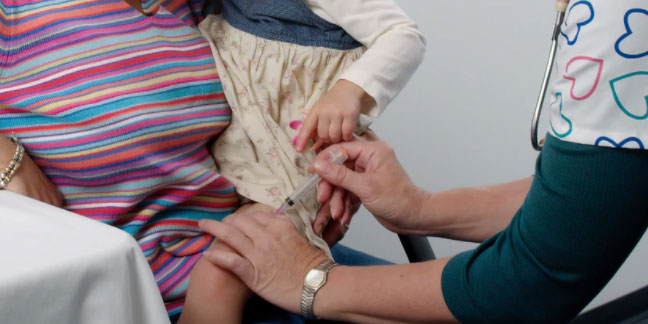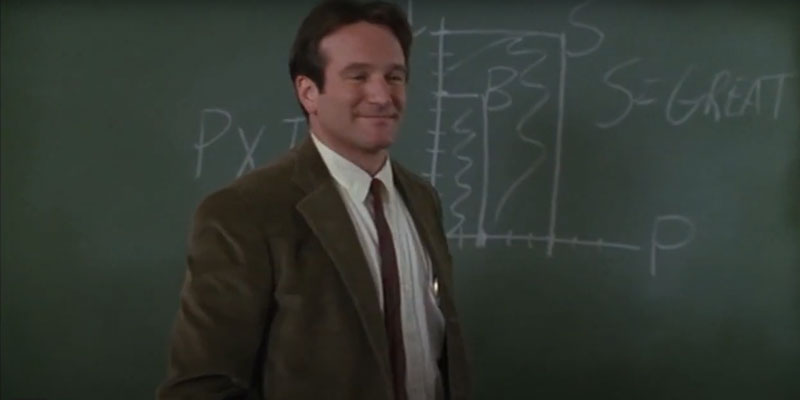Frida Ghitis of CNN reminds me of that classic arcade game, Dig Dug, the way she works to inflate Joe Biden’s performance during a softball town hall on her network, but her closing line raises an interesting question:
In the end, Biden’s political standing will depend not on the impact of the town hall, but on the success of his negotiations to pass his legislative agenda.
That’s kind of pat political analysis, but I wonder if it’s actually true. Biden’s legislative agenda is far beyond what the voters sanctioned in the last election (even if the results were legitimate). It’s entirely possible that actually passing Biden’s agenda would cement his unpopularity. Payoffs to special interests only get politicians so far when the policies produce disastrous outcomes for the country.
[Open full post]Meghan Grady discusses Meals on Wheels, and Eric Letendre gives tips on dog training.
[Open full post]Joel Holmes explains:
Yes, the battle against the insane electric car policy and the whole Green New Deal can be won, using just three little words.
Well, to be exact six words, and here they are:
Solar Panels Don’t Work At Night
As an alternative energy engineer, I had the misfortune to work with solar electric panels occasionally. They are an environmental nightmare.
The inability to work at night is really just the rotten cherry on top of the problems.
[Open full post]Alex Cannon is the Republican candidate in the race for the open Rhode Island Senate seat representing the East Side of Providence, but progressive journalist Steve Ahlquist conducted a lengthy, interesting, and fair interview with him on Uprise RI.
Cannon, who hails from Las Vegas, Nevada, and arrived in Rhode Island in 2017, describes himself as “a conservative Republican with freckles of libertarianism, which is the right place to be (in this writer’s opinion). One can tell, however, that he’s still in the piecing-it-all-together phase of his political-philosophical development. After all, when asked if he’s got a path to victory, he gave the progressive activist writing for publication a detailed answer about strategy that would be more appropriate for a private meeting with a Republican donor.
In any event, he acknowledges the long odds in advance, so hopefully he’ll stick around, become more engaged, and move to the next phase. If his longshot for a General Assembly seat doesn’t pan out, perhaps he’ll consider a shift of focus to city council. Many of the sticking points for his neighbors (e.g., abortion) are much less relevant at that level, while the more-practical considerations of municipal government would play to his intelligence and his degree in economics.
Beyond simply getting to know the candidate, one observation from the interview that’s worth mulling over has to do with the posture of a Republican entering a battlefield that’s been “a Democratic stronghold for so long.” The tendency is (understandably) to want to seem non-threatening, which may be appropriate for essentially religious issues like abortion that require long-term cultural shifts to change. But Republicans run in these areas because Democrats have failed so miserably and so manifestly. Threatening that failure is a selling point, not a liability.
With education, for instance, the city and state have been abysmal failures. Everybody knows it. It’s documented as fact in an academic report and has been recognized nationally. This is not an area that calls for careful, wonky solutions like a little more respect for charter schools and a slight increase in the money available through a complicated program like tax-credit-funded scholarships to private schools. (Tax credits for evil corporations? What?)
Progressives don’t approach politics like that. To them, being pro-life is making slaves of women. Climate change is going to kill us all if we don’t take cars away and increase the cost of electricity massively.
In an urban setting, education policy is like a rich fruit with a tough skin. It has the potential to completely shake up the political landscape, but it has to be forcefully entered. And yes, the case has to be made. Making excuses for the status quo, Ahlquist asserts that “there’s not a lot of government could do about mandating behavior in homes.” To progressives, this is justification for giving government more control outside of the home, but for conservatives, it’s an opportunity to make the case for the incentives that come with opportunity and for the ability of individuals and families to grow.
Conservatives can’t enter a heavily Democratic district with all ideological guns blazing, but they also can’t come in trying to sell a more competent version of the same old approach. Fear of the unknown and the groundwork the Left has done demonizing conservatism won’t be overcome that way.
[Open full post]We need to order some of this attitude from across the Pond:
[Open full post]The British government has instructed schools not to “teach contested theories and opinions as fact,” including contested views about so-called “white privilege.”
The government on Thursday published its response to a report from the UK Parliament’s Education Select Committee, which said that the use of terms such as “white privilege” may be one of the reasons white working-class pupils are persistently falling behind.
In a report published in June, the committee said that its 14-month inquiry on left-behind white pupils from disadvantaged backgrounds had shown that “poor white pupils are far from ‘privileged’ in education.”
Locally, the Rhode Island opposition (such as it is) is grappling with the shifting ground of our rights.
Presumably, for example, parents have a right to send their children to schools that do not provide pornographic material to them and to demand a reversal via school committee meetings when that reasonable expectation is not met. But what if special interests and ideologues have captured the electoral process, the United States Department of Justice begins targeting parents as domestic terrorists, and the state attorney general refuses to take legal action against the schools? (Jeez, even just typing that, I wish I could believe I’m being a conspiracy theorist.)
In that case, parents do not actually have the rights we all assumed they did, because they have no way of enforcing them.
Tiverton has a wonkier, although clearer, example. A few decades ago, we adopted provisions in our town charter that require all revenue to the town to go into the general fund, where it would be available for budgeting at financial town meetings, and requiring the town council to secure a vote of the people whenever they want to spend more than $500,000 off-budget. A little less than a decade ago, we wrote into our town charter a process changing that meeting to a referendum and allowing citizen budget proposals on the ballot.
Our current town council passed an ordinance in contravention of all of those provisions and used it as justification to remove every budget except its own from the referendum ballot under the dishonest cover of their hired town solicitor, Michael Marcello. Language that has been consistently understood to mean the same thing from the time it was drafted until about a year ago has simply been swept away, and so far, Newport Superior Court is not concerned. Meanwhile, our Municipal Court judge claims he has no authority (despite the clear language of the charter) to permit the charter complaint process described under “Enforcement” in the charter.
Residents therefore have no actual, enforceable rights that the current government officials of the town don’t deign to permit.
Jon Sanders captures this problem well, in a national context, writing for the American Institute for Economic Research:
[Economist Paul] Heyne presented the idea in just two paragraphs in his chapter on the distribution of income, after discussing property rights that are so affected by government regulation that they are effectively rights in name only for owners who cannot act as owners (e.g., rent controls preventing competitive price setting). After introducing that counterintuitive notion, Heyne wrote, “A useful distinction that can often help us agree on what we’re talking about is the distinction between actual, legal, and moral property rights.” He then added, “It is the people’s actual rights that govern their expectations and consequently determine how they will behave.”
People’s actual rights are what ultimately matter in social encounters. Legal rights matter — and converge with actual rights — insofar as they are enforceable and publicly accepted. Moral rights are normative declarations of what should be actual, legal rights. Ideally, of course, actual, legal, and moral rights would be the same rights.
Sanders suggests that Joe Biden has increasingly been testing his ability to assert actual rights that he explicitly knows aren’t legal rights, often with a claim of having a moral right to do so. Rhode Islanders’ experience can lead us to find Sanders’s expectations for enforcing legal rights overly optimistic.
If you seek to enforce a legal right and are rebuffed, then you lose even the claim that it is a legal right. That leaves only assertions of moral rights, which is where we have to concentrate, not the least because an army of advocates are joining President #LetsGoBrandon in asserting a moral right to take our actual rights away.
Featured image by Aaron Burden on Unsplash.
[Open full post]Here’s the key paragraph in this Epoch Times article about a California teacher who’s been put on leave after wearing a paper headdress and dancing in a (let’s say) indigenous fashion to drive home a math lesson:
“It is damaging and disheartening to see Native American and indigenous culture represented in such a trite and insensitive way. However, this is not an isolated incident, as such teaching practices, even in math classes, have been used across the nation. It is time that we stop this behavior.”
That’s from a statement by state legislators, and it’s an incredible cultural artifact in that its factual assertion can be read in two ways. To the woke, the common nature of such lessons is proof of the mountain of work they have to change the world in their own image. To sane people, it’s an illustration that this is very common and has for years been widely regarded as unobjectionable.
We have to get back to that sense of ourselves as a single community with many cultural influences that we can share, in seriousness and fun, without giving offense.
[Open full post]Pfizer is claiming a diluted version of its COVID-19 vaccine is more than 90% effective among small children, but the numbers in its study implicitly raise the question of whether it’s necessary:
A Pfizer study tracked 2,268 kids in that age group who got two shots three weeks apart of either a placebo or the low-dose vaccine. Each dose was one-third the amount given to teens and adults.
Researchers calculated the low-dose vaccine was nearly 91% effective, based on 16 COVID-19 cases in youngsters given dummy shots versus three cases among vaccinated children. There were no severe illnesses reported among any of the youngsters, but the vaccinated ones had much milder symptoms than their unvaccinated counterparts.
Only 1.4% of the kids with a placebo tested positive for COVID during the study, which compares unfavorably with 0.3% of those who were vaccinated, but so what? None of the children had severe illnesses.
The only argument for vaccinating children is to completely take them off the table as transmitters of the disease, but then what do we make of all the talk in recent months about how the vaccine doesn’t actually prevent people from carrying and transmitting it, only lessening the severity? If that’s the case, then the rational path is to encourage vulnerable people to be vaccinated, bringing their susceptibility down as far as possible, and going on with our lives. We’re already there.
Take special note that this is my view, and I’m a supporter of adult vaccination. How many millions of people are on the same ground or even more skeptical?
As elites in the government and news media ramp up to force this vaccine on children, one side effect they really ought to factor in is the social one. The effect of trying to mandate this injection for children will be many times greater than the very limited attempts to mandate it for certain categories of professions. Families will withdraw from schools, with many pulling up stakes and leaving for freer lands entirely, and that’s just a starter. Whether conscious or not, that action will be in part a response to the long-term implications of this shift in the assumed authority of the collective.
And don’t doubt that the call for a mandate will go out. It’s been increasingly clear that the driving motivation — the thing that really moves the advocates — is terror that government may lack the power to force people to do things the smart set believes they ought to do when it comes down to an irreconcilable difference. Add in the self-protective instincts of the increasingly elderly (and aptly named) Me Generation, and a fight is very likely.
Featured image by the CDC on Unsplash.
[Open full post]This shift in the calculation of and requirements for flood insurance will be something to keep an eye on:
For the first time, the Federal Emergency Management Agency (FEMA) is about to incorporate climate risk into the cost of flood insurance. The impact will be a dramatic increase in the cost of flood insurance. In Rhode Island, many policyholders will see their premiums go up and continue to increase by as much as 18 percent annually for the next 20 years.
I’m open to the possibility that legacy flood-risk assessments were simplistic in a way that benefited special interests, like rich people, but the use of words like “equity” point to the probability that the system won’t me more accurate so much as put in the service of different special interests.
Here’s the question I have: With the calculations so heavily based on models (versus proven experience), suppose they prove to be completely off; what is the feedback or correction mechanism? If all homeowners can do is try to change the culture and the mix of elected officials so that the bureaucracy shifts its emphasis, that’s a recipe for a great deal of mischief.
[Open full post]During a long and far-reaching conversation between Jordan Peterson, Adam Carolla, and Dennis Prager, the trio thought through the reason an insidious concept like critical race theory is gaining such a foothold when areas of society like athletics ought to teach us the folly of its lessons. Prager raised the lunacy of classical orchestras’ discarding blind auditions in order to address an assumed “systemic racism.”
In blind auditions, you can’t see who’s playing. There can be no actual racism, so the orchestras are implicitly lowering their standards based on an assertion that different outcomes must therefore mean the racism is applied elsewhere, as part of the fiber of the system.
They suggested that sports are more immune to this sort of thinking because of the sheer, visible absurdity it would produce. It’s too easy to judge merit in sports. A classical music audience may vaguely feel a performance was off, but it’s not as if they can watch two orchestras, or even two soloists, battle it out. In sports, the result is right there on the court or the field and right there on the scoreboard.
So, since human beings are wired to measure and compare, we are susceptible demands to judge things of less-overt merit by something other than merit that is measurable, like the skin color of the participants. One could make the case that our society has advanced in proportion to the degree to which we’ve been able to make intangibles more measurable so that which is essential can compete with that which is only incidental. As science branched off from philosophy, for example, we could judge results independently of practitioners.
This idea brings to mind that famous scene in Dead Poets Society in which Robin Williams’s character has his students rip out of their poetry textbook a preface that proposes a system for measuring the greatness of poems. “Excrement,” he calls it. So easily mocked and obviously wrong does the movie present this scholarly approach that the viewer marvels that any textbook writer — even a fictitious one — would be so blind as to publish it. Clearly, the proposition goes, these people who’ve devoted some not-insignificant amount of time to the reading, aggregation, and consideration of poetry have no true appreciation of poems.
Here’s a question that didn’t occur to me when I first saw this movie as a teenager 30 years ago: What is the status of poetry now compared with its status before our culture ripped the scholarly page out of its book? During one of my music courses in college, we students laughed to hear that romantic composer Robert Schumann held poetry to be a finer art than music. How far poetry had fallen from Schumann’s day to the days of my youth, and by now it is all but dead. For most people, poetry doesn’t exist outside of mandatory school classes. For even more people, it doesn’t inspire.
First went the challenge of it, with the erasure of rhyme and meter, and then went the ability to assess it according to any objective measurement. And then, it just went. Our modernizing, increasingly progressive society made poetry easier to write, removed all standards, and proclaimed it wholly subjective. As a result, the art form cannot accomplish its central purpose, which is to communicate from one person to many people.
If poetry is wholly subjective, and if it is less up to the poet to appeal to you than it is up to you to be moved by poetry (as modeled in Dead Poets Society), perhaps a black poet’s work does not appeal to a white reader because he or she is racist. And if, when all the chips are counted, fewer black poets find audiences than do white poets despite ambiguity of race in their names, perhaps that is because the racism is systemic.
While wrong-headed in many ways, such a theory has a level of plausibility at the high water mark of civilization’s incoming tide, where even the arts were subjected to analytical scrutiny. It is less plausible, however, as that tide recedes and a baser tribal instinct seeks to apply the theory where objective analysis is much more obviously relevant.
For that reason, the lunatics following the tide out raving must impose their subjective scrutiny by force, and if they succeed, the result will be for humanity what it was for poetry.
[Open full post]






